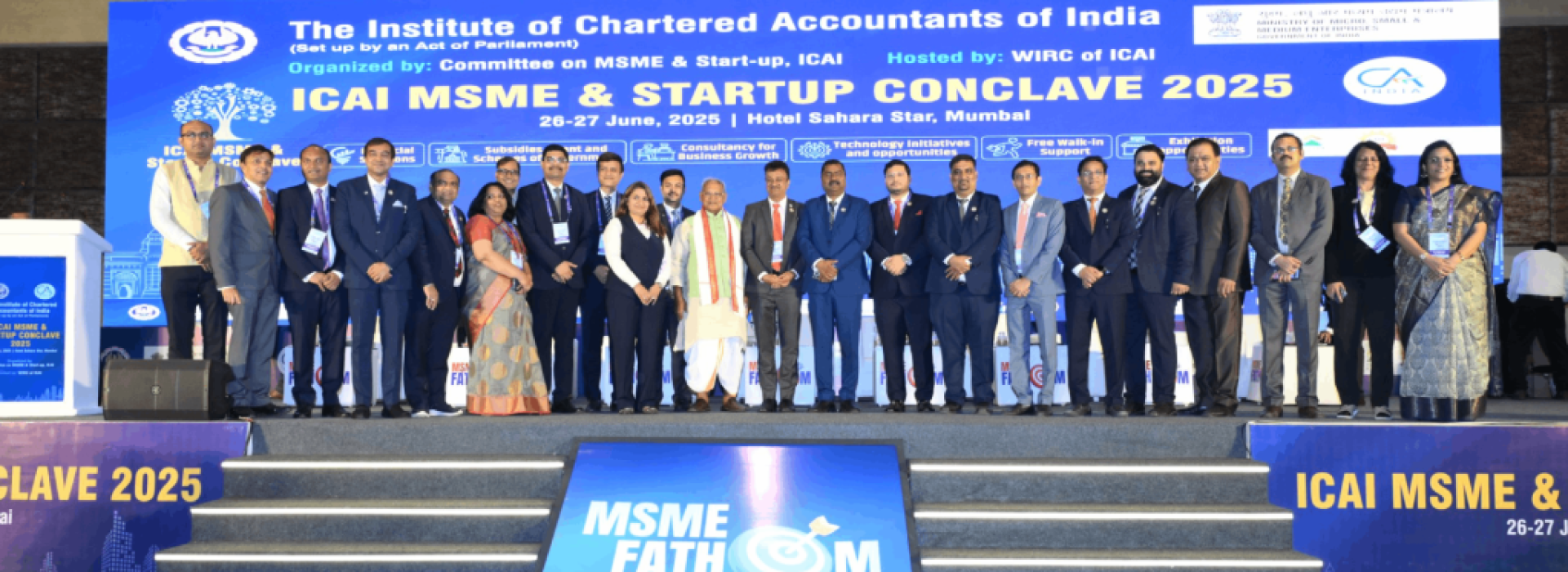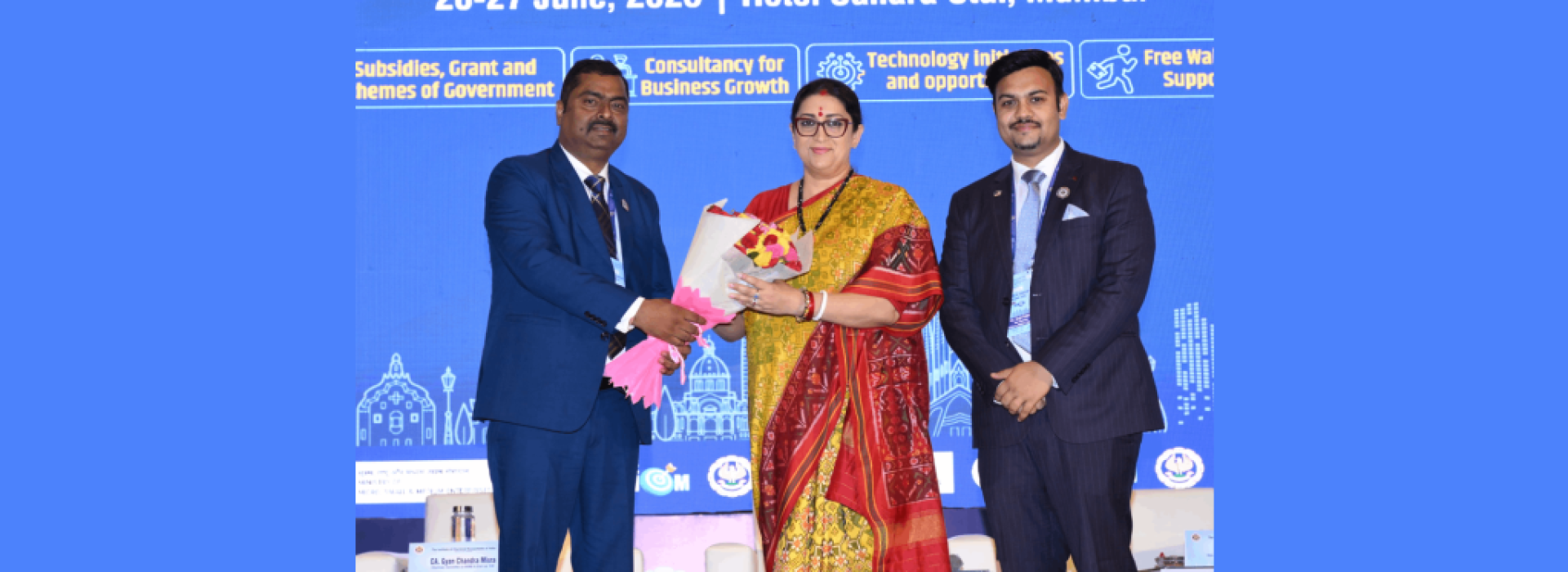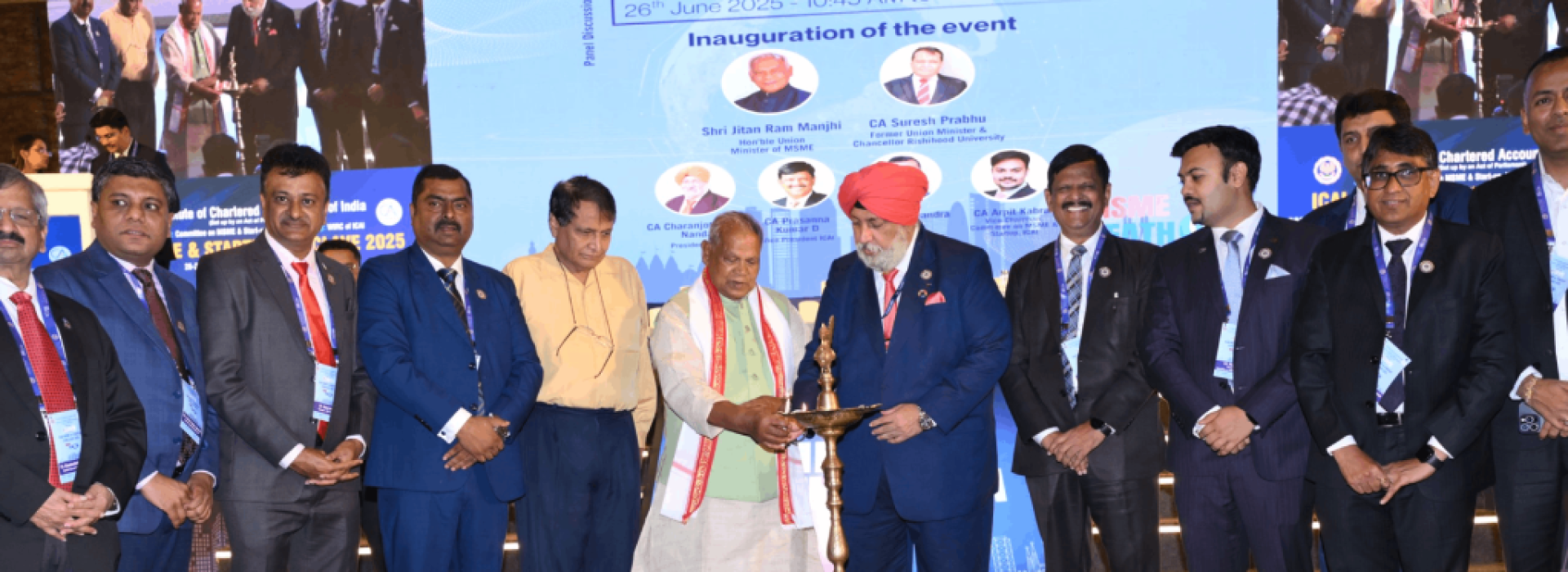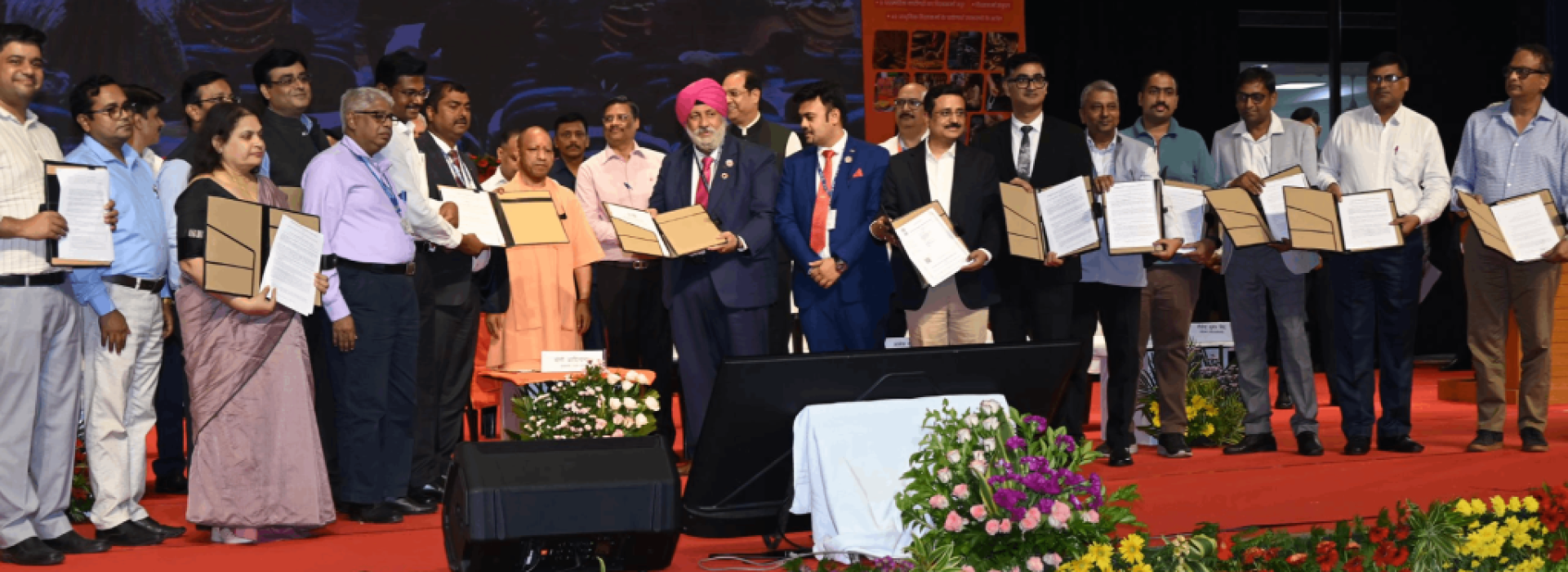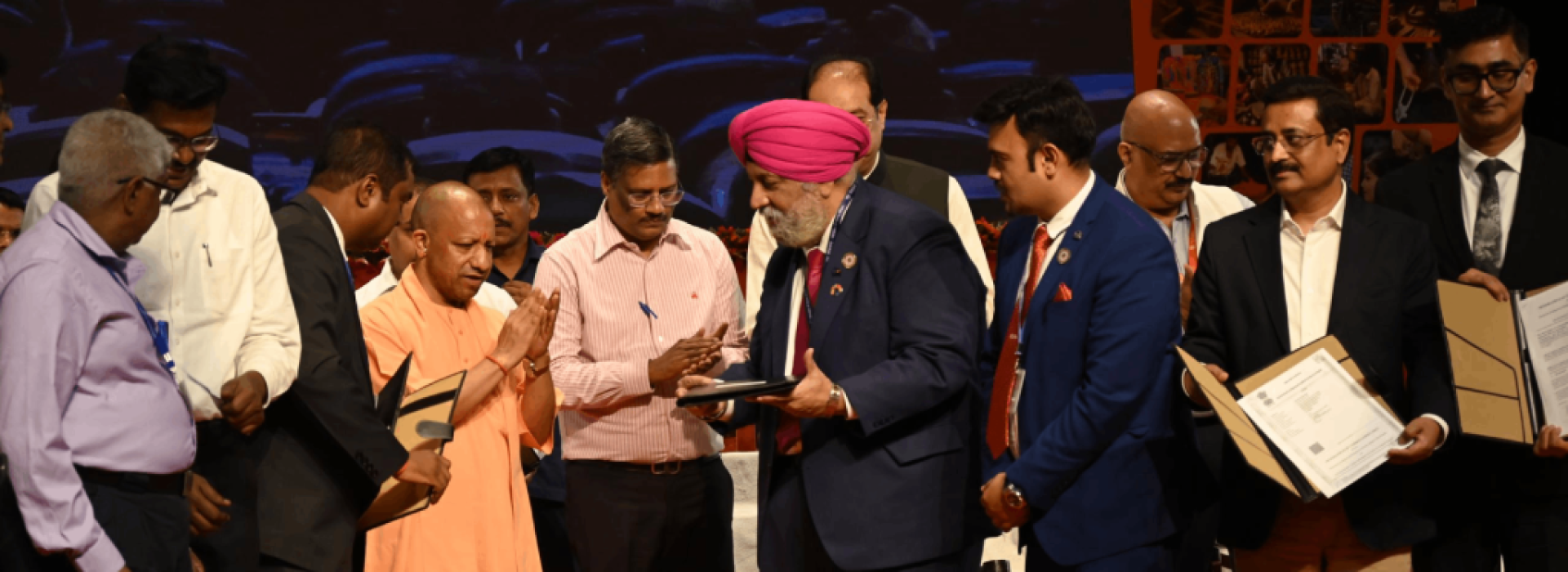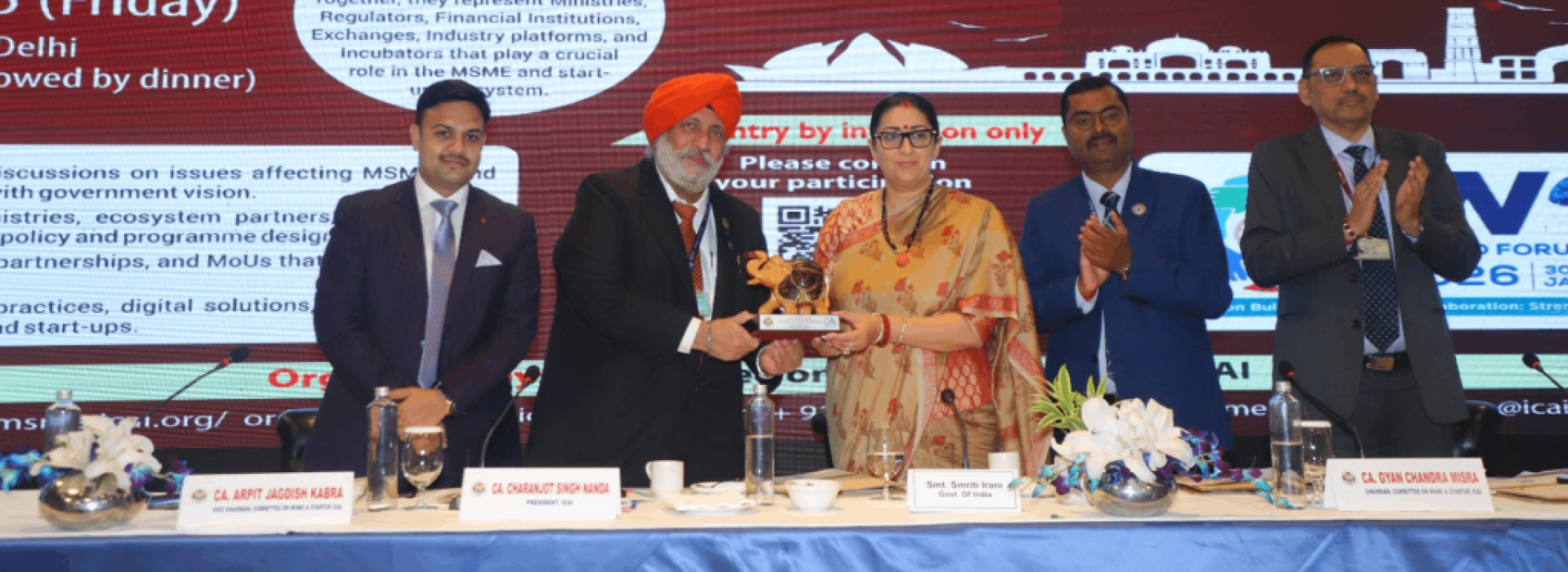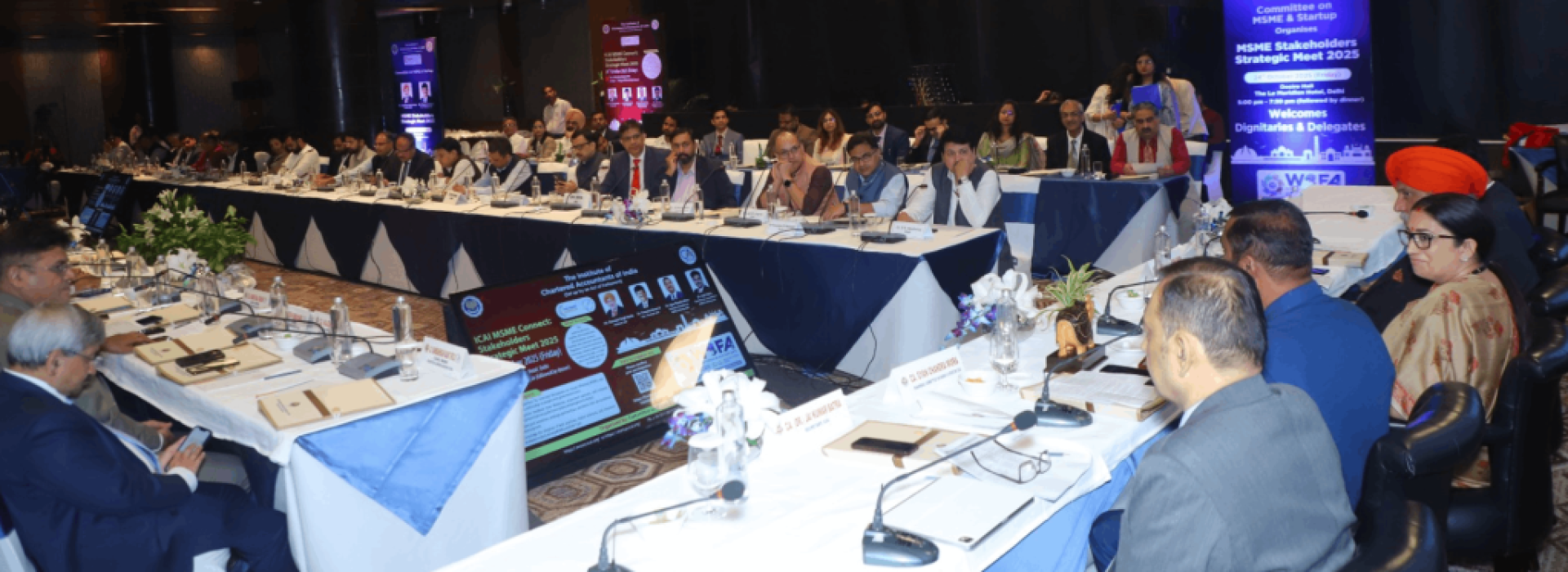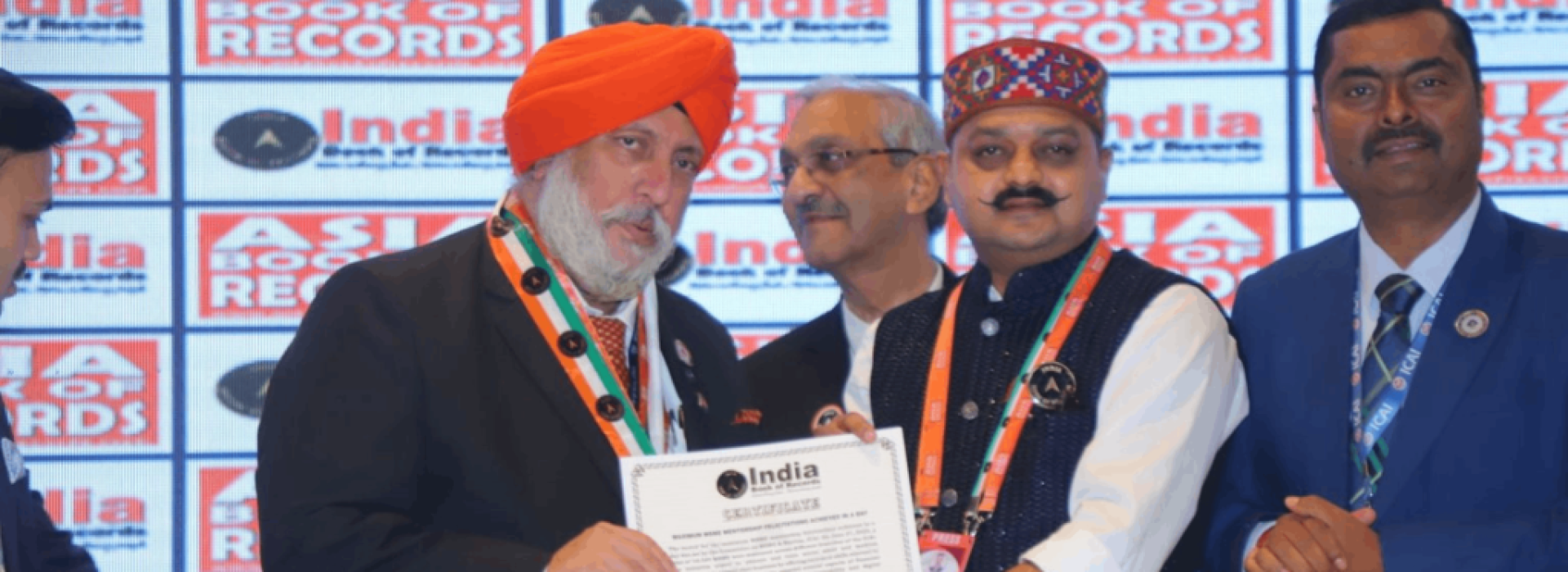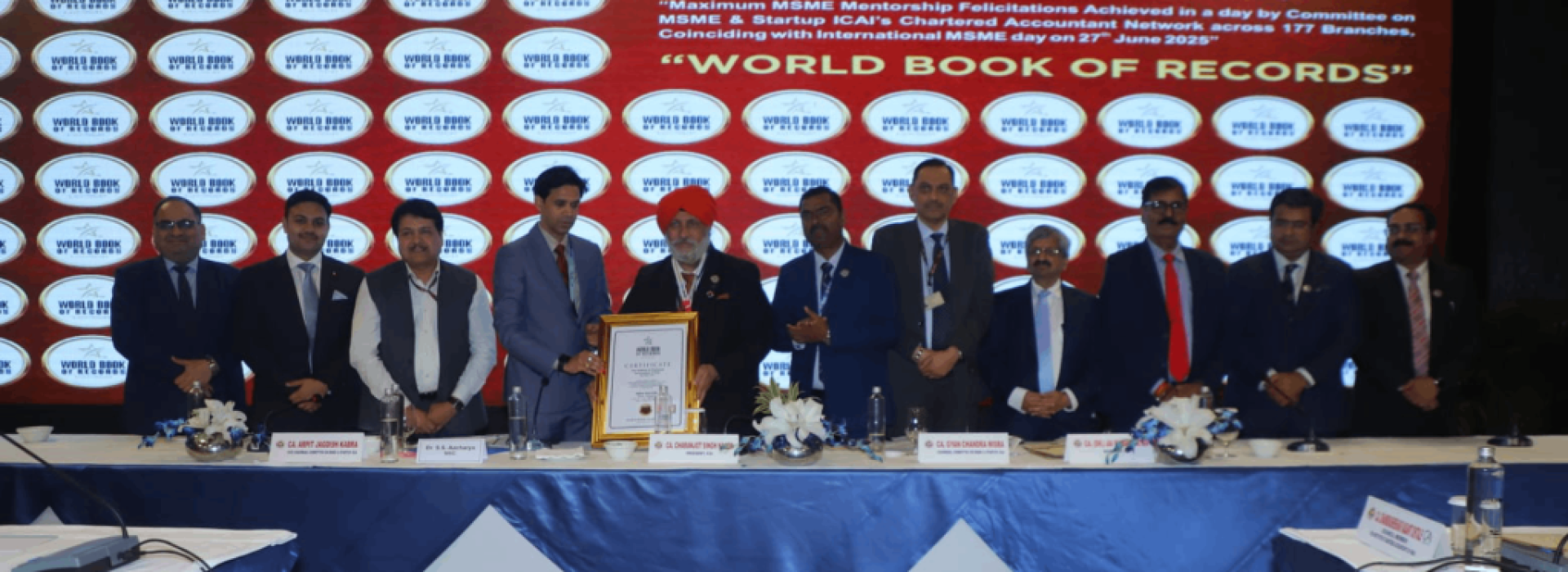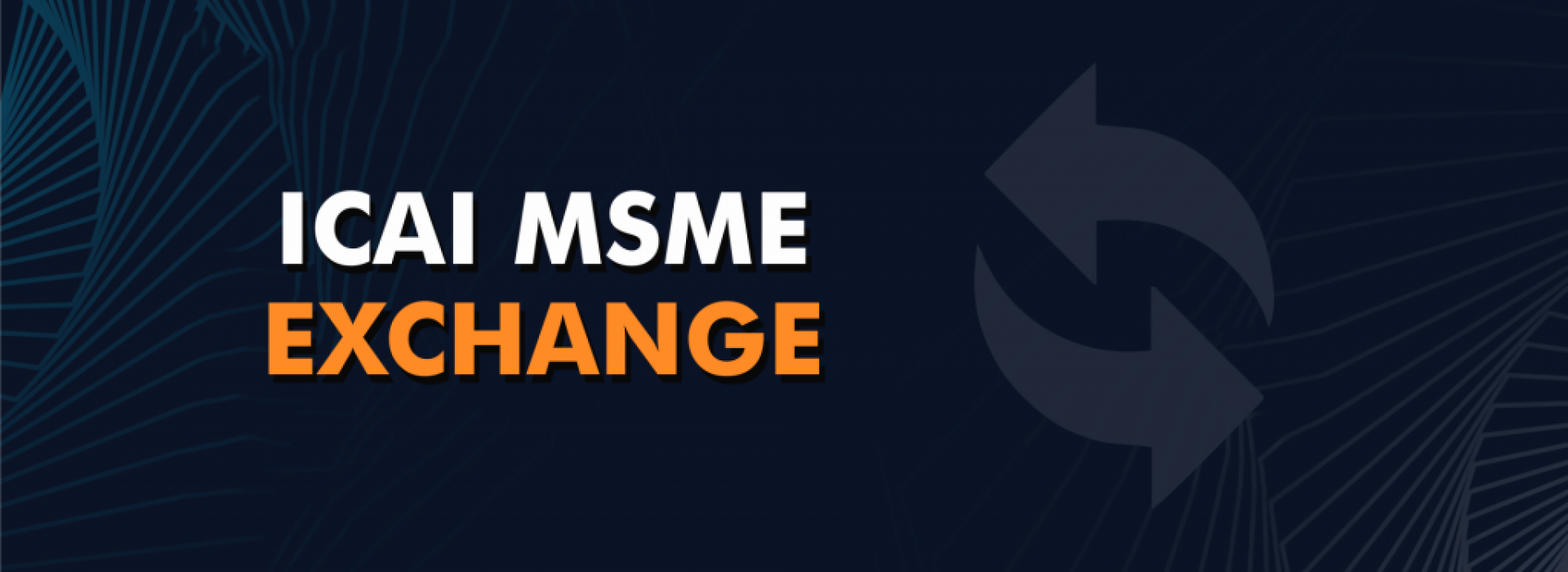ICAI MSME Clinic

To know more about ICAI MSME Branch Clinic

CA. Charanjot Singh Nanda
ICAI
CA. Prasanna Kumar
D
ICAI
CA. Gyan Chandra Misra
Committee on MSME & Startup, ICAI
CA. Arpit Kabra
Committee on MSME & Startup, ICAI
With the objective of Capacity Building of MSMEs & Start-up, the Institute is responsive to the emerging challenges of MSMEs & Start-ups and constitutes the Committee on MSME & Start-ups for effectively meeting newer challenges with the following terms of reference:
- To address the issues & challenges faced by MSMEs & Start-ups, review the impediments and to suggest measures/changes in this regard for strengthening and developing the capacity of MSMEs & Start-ups enhancing their competence and improving their visibility amongst the business community and to develop & Provide the Capacity Building Measures for the enhancement of the Portfolio of the MSMEs & Start-ups.
- To promote the MSMEs & Start-ups by way of encouraging collaboration amongst the professionals/experts in the relevant fields and establishing the Bridge among the appropriate authority & MSMEs/Start-ups by means of various endeavors in Capacity Building & other Measures for them.

-
Q 1 . What kind of business comes under MSME?
Ans : All Business activities – Services and Manufacturing are covered in MSME sector except activities as mentioned in O.M. 5/2(1)/2020-P&G/Policy dated 17.07.2020.
Q 2 . Is GST mandatory for MSME?
Ans : As per para 5(3) of the Notification no. S.O. 2119(E) dated 26.06.2020, the turnover related figures of such enterprise which do not have PAN will be considered on self-declaration basis for a period up to 31st March, 2021 and thereafter, PAN and GSTIN shall be mandatory.
Q 3 . Are traders eligible for MSME?
Ans : As per the current definition of MSME, wholesale and Retail trade (vide O.M. 5/2(1)/2020-P&G/Policy dated 17.07.2020) are not eligible to register as MSMEs.
Q 4 . How many days it will take to get MSME certificate?
Ans : To facilitate the procedure of MSME registration in accordance with the revised MSME definition, Ministry of MSME launched a new portal – Udyam Registration Portal (udyamregistration.gov.in), on 1st July 2020.
It is a unified portal with registration process that is free of cost, paperless and digital. The portal is aimed at reducing transaction time and costs for entrepreneurs and promote Ease of Doing Business. Generally it takes 2-3 days, in cases wherein GST/PAN details are part of registration. Those without PAN details, the certificate is available on the same day.
Q 5 . Which services are covered under MSME?
Ans : All services are covered under MSME except activities as mentioned in O.M. 5/2(1)/2020-P&G/Policy dated 17.07.2020.
Q 6 . What is difference between MSME, MSE and SME?
Ans : MSME stands for Micro, Small, and Medium Enterprises whereas MSE stands for Micro and Small Enterprises and SME stands for Small and Medium Enterprises. In some countries SME is more frequently in use.
Q 7 . What is the eligibility for MSME?
Ans : MSMEs have been defined vide Notification No. S.O.2119(E) dated 26.06.2020.
Q 8 . Does travel agency come under MSME?
Ans : All services are covered under MSME except activities as mentioned in O.M. 5/2(1)/2020-P&G/Policy dated 17.07.2020. Accordingly, Travel Agency is covered under
-
Q 1 . What are the measures announced by the government under “Atmanirbhar Bharat 3.0” to mitigate unemployment due to COVID 19 pandemic?
Ans : In order to incentivize job creation during COVID-19 recovery phase, the government has launched “AatmaNirbhar Bharat Rozgar Yojana”which aims to provide benefit to both enterprise and jobseeker registered under EPFO.
Q 2 . Are firm/establishment also eligible to avail benefits under “AatmaNirbhar Bharat Rozgar Yojana”?
Ans : Yes, the Central Govt. has announced to provide subsidy for two years in respect of new eligible employees drawing monthly wages less than Rs. 15,000, engaged on or after 01.10.2020 at following scale:
- Establishments employing up to 1000 employees: Employee’s contributions (12% of Wages) & Employer’s contributions (12% of wages) totaling 24% of wages
- Establishments employing more than 1000 employees: Only Employee’s EPF contributions (12% of EPF wages)
Q 3 . Till when is the Emergency Credit Line Guarantee Scheme been extended?
Ans : The Emergency Credit Line Guarantee Scheme has been extended till March 31, 2021.
Q 4 . Who are eligible to avail benefits under the extended term of ECLG scheme?
Ans : Under the ECLG 2.0 scheme, MSMEs, businesses, individual loans for business purposes and MUDRA borrowers are eligible under the scheme.
Q 5 . Are there any additional benefits extended under Emergency Credit Line Guarantee Scheme 2.0?
Ans : With a view impetus to the economic activity during COVID 19 recovery phase, the government has announced Emergency, Credit Line Guarantee Support Scheme 2.0 (ECLGS 2.0) for Healthcare sector and 26 stressed sectors with credit outstanding of above Rs. 50 crore and up to ₹ 500 Crores on 29.2.2020 stressed due to COVID-19.
Q 6 . What are the additional measures announced for MSMEs under Emergency Credit Line Guarantee Scheme?
Ans : Under the Scheme, Entities will get additional credit up to 20% of outstanding credit with a tenor of five years, including 1-year moratorium on principal repayment. This scheme will be available till 31.3.2021.
Q 7 . Which sectors have been added under Production-Linked Incentives Scheme?
Ans : The government has announced 10 more Champion Sectors which will be covered under the Production Linked Incentives Scheme with a total amount of nearly 1.5 Lakh Crore to help boost competitiveness of domestic manufacturing. The ten sectors are – Advance Cell Chemistry Battery, Electronic/Technology Products, Automobiles & Auto Components, Pharmaceuticals Drugs, Telecom & Networking Products, Textile Products, Food Products, High Efficiency Solar PV Modules, White Goods (ACs & LED), and Specialty Steel.
Q 8 . What are the additional benefits announced under PM Awaas Yojana – Urban to deal with the current COVID 19 crisis?
Ans : Under the scheme, the government has allotted ₹18,000 crore additional outlay over and above Rs. 8000 Crore already allocated this year.
Q 9 . What relief measures have been announced for Construction & Infrastructure sector ?
Ans : To provide ease of doing business and relief to contractors whose money otherwise remains locked up, performance security on contracts has been reduced from 5-10% to 3%. It will also extend to ongoing contracts and Public Sector Enterprises.
Q 10 . What relief measures have been taken under Real estate sector?
Ans : With a view to provide income tax relief to both developers and buyers, the differential between circle rate and agreement value in real estate income tax under Section 43 CA of IT Act has been increased from 10% to 20%. Consequential Relief up to 20% shall also be allowed to buyers of these units under section 56(2)(x) of IT Act till June 30, 2021.
Q 11 . What relief measures have been taken under Agriculture sector?
Ans : As fertilizer consumption is going up significantly, ₹65,000 Crore is being provided to ensure increased supply of fertilizers to farmers to enable timely availability of fertilizers in the upcoming crop season.
Q 12 . Is there any support announced for strengthening rural economy?
Ans : With a view to revive and strengthen rural economy and provide employment opportunity, the government has allocated additional outlay of ₹10,000 Crore under PM Garib Kalyan Rozgar Yojana.
Q 13 . What measures are being taken under the “AtmaNirbhar Bharat 3.0” to boost export from the country?
Ans : ₹3,000 Crore boost is being provided to EXIM Bank for promoting project exports under Indian Development and Economic Assistance Scheme (IDEAS Scheme). This will help EXIM Bank facilitate Lines of Credit development assistance activities and promote exports from India.
Q 14 . What is the budget allocated for capital and industrial expenditure under the “AtmaNirbhar Bharat 3.0”?
Ans : ₹10,200 Crore additional budget stimulus is being provided for capital and industrial expenditure on domestic defence equipment, industrial infrastructure and green energy.
Q 15 . What steps are being taken to ensure production of COVID 19 Vaccine?
Ans : Giving due importance to the current global pandemic and to ensure focused effort to arrest the spread, the government has allocated Rs. 900 crores under COVID Suraksha Mission for Research and Development of Indian COVID Vaccine to Department of Biotechnology.
-
Q 1 . What are the measures announced by the government under “Atmanirbhar Bharat” for MSMEs?
Ans : Ans : Keeping in view the hardship faced by MSMEs during COVID 19 pandemic crisis, the government has announced several measures intended to provide the necessary support to deal with the current economic crisis such as:
Rs 3 lakh crore Collateral-free Automatic Loans
Rs 20,000 crore Subordinate Debt for Stressed MSMEs
Rs 50,000 croreEquity infusion for MSMEs through Fund of Funds
Global tenders to be disallowed up to Rs 200 crore
Revised definition of MSMEs
All receivables of MSMEs will be cleared by Government and PSU in 45 days
Q 2 . What is the Credit Guarantee Scheme for MSEs (CGTMSE)?
Ans : The Ministry of MSME, Government of India and SIDBI set up the Credit Guarantee Fund Trust for Micro and Small Enterprises (CGTMSE) with a view to facilitate flow of credit to the MSE sector without the need for collaterals / third party guarantees. The main objective of the scheme is that the lender should give importance to project viability and secure the credit facility purely on the primary security of the assets financed. The Credit Guarantee scheme (CGS) seeks to reassure the lender that, in the event of a MSE unit, which availed collateral – free credit facilities, failing to discharge its liabilities to the lender, the Guarantee Trust would make good the loss incurred by the lender up to 85 per cent of the outstanding amount in default.
The CGTMSE would provide cover for credit facility up to Rs. 200 lakh which have been extended by lending institutions without any collateral security and /or third-party guarantees. A guarantee and annual service fee is charged by the CGTMSE to avail of the guarantee cover. For more details you may visit www.cgtmse.in.
Q 3 . What is Trade Receivables Discounting System (TReDS)?
Ans : The objective of TReDS is to create Electronic Bill Factoring Exchanges which could electronically accept and settle bills so that MSMEs could encash their receivables without delay. This will not only give them greater access to finance but will also put greater discipline on corporates to pay their dues on time. For more details you may refer to RBI guidelines for setting up and operating TReDS on their website https://www.m1xchange.com/treds.php.
Q 4 . What is Trade Receivables Discounting System (TReDS)?
Ans : The objective of TReDS is to create Electronic Bill Factoring Exchanges which could electronically accept and settle bills so that MSMEs could encash their receivables without delay. This will not only give them greater access to finance but will also put greater discipline on corporates to pay their dues on time. For more details you may refer to RBI guidelines for setting up and operating TReDS on their website https://www.m1xchange.com/treds.php.
Q 5 . Who are the participants in TReDS?
Ans : Sellers, buyers and financiers are the participants on a TReDS platform.
Q 6 . Who can participate as a seller in TReDS?
Ans : Only MSMEs can participate as sellers in TReDS.
Q 7 . Who can participate as a buyer in TReDS?
Ans : Corporates, Government Departments, PSUs and any other entity can participate as buyers in TReDS.
Q 8 . Who can participate as a financier in TReDS?
Ans : Banks, NBFC – Factors and other financial institutions as permitted by the Reserve Bank of India (RBI), can participate as financiers in TReDS.
Q 9 . How does TReDS work?
Ans : Broadly, following steps take place during financing / discounting through TReDS:
– Creation of a Factoring Unit (FU) – standard nomenclature used in TReDS for invoice(s) or bill(s) of exchange – containing details of invoices / bills of exchange (evidencing sale of goods / services by the MSME sellers to the buyers) on TReDS platform by the MSME seller (in case of factoring) or the buyer (in case of reverse factoring);
– Acceptance of the FU by the counterparty – buyer or the seller, as the case may be;
– Bidding by financiers;
– Selection of best bid by the seller or the buyer, as the case may be;
– Payment made by the financier (of the selected bid) to the MSME seller at the agreed rate of financing / discounting;
– Payment by the buyer to the financier on the due date.
Q 10 . What is a Factoring Unit (FU)?
Ans : A Factoring Unit (FU) is a standard nomenclature used in TReDS for invoice(s) or bill(s) of exchange. Each FU represents a confirmed obligation of the corporates or other buyers, including Government Departments and PSUs.
Q 11 . Who can participate as a financier in TReDS?
Ans : Banks, NBFC – Factors and other financial institutions as permitted by the Reserve Bank of India (RBI), can participate as financiers in TReDS.
Q 12 . How does TReDS work?
Ans : Broadly, following steps take place during financing / discounting through TReDS:
– Creation of a Factoring Unit (FU) – standard nomenclature used in TReDS for invoice(s) or bill(s) of exchange – containing details of invoices / bills of exchange (evidencing sale of goods / services by the MSME sellers to the buyers) on TReDS platform by the MSME seller (in case of factoring) or the buyer (in case of reverse factoring);
– Acceptance of the FU by the counterparty – buyer or the seller, as the case may be;
– Bidding by financiers;
– Selection of best bid by the seller or the buyer, as the case may be;
– Payment made by the financier (of the selected bid) to the MSME seller at the agreed rate of financing / discounting;
– Payment by the buyer to the financier on the due date.
Q 13 . What is a Factoring Unit (FU)?
Ans : A Factoring Unit (FU) is a standard nomenclature used in TReDS for invoice(s) or bill(s) of exchange. Each FU represents a confirmed obligation of the corporates or other buyers, including Government Departments and PSUs.
Q 14 . Who can create a FU?
Ans : In TReDS, FU can be created either by the MSME seller or the buyer. If MSME seller creates it, the process is called factoring; if the same is created by corporates or other buyers, it is called as reverse factoring.
Q 15 . Whether TReDS could deal with reverse factoring?
Ans : Yes. The TReDS could deal with both receivables factoring as well as reverse factoring.
Q 16 . Whether the MSME seller would have to pay to the financier in case the buyer defaults in repayment?
Ans : No. The transactions processed under TReDS are “without recourse” to the MSMEs.
Q 17 . Whether any authorization is required to set up and operate a TReDS platform?
Ans : Yes, authorization is required to be obtained from RBI under the Payment and Settlement Systems (PSS) Act, 2007.
Q 18 . Whether TReDS entities undertake KYC (Know Your Customer) of participants?
Ans : Yes. The KYC process adopted by the TReDS entities shall adhere to the “Master Direction – Know Your Customer (KYC) Direction, 2016” dated February 25, 2016 (as amended from time to time) issued by RBI.
-
Q 1 . What benefits do the MSME Technology Centres of Ministry of MSME provide to MSMEs?
Ans : MSME Technology Centres are equipped with state-of-the-art machinery & equipment. They are engaged in designing and manufacturing of quality tools, which are necessary for producing quality products and improve the competitiveness of MSMEs in national and international markets. They also conduct training programmes to provide skilled manpower to industries specially MSMEs. The placement of trainees trained in Tool Room is more than 90%. There are 18 Technology Centres under DC (MSME), a list of MSME Technology Centres and their details is available in the website http://dcmsme.gov.in/Toolroom_tdcs.htm .
Q 2 . What support is provided by the Ministry for improving manufacturing competitiveness?
Ans : To enhance the competitiveness amongst the MSMEs, there are six components for capacity building, technology upgradation, design interventions, products, IP rights to improve the productivity and handhold to deliver top quality productivity using lean technologies, to nurture ideas from professional beyond the traditional and to make MSME digitally powered under the umbrella program of Credit linked Capital subsidy Scheme and Technology Upgradation (CLS-TUS)
Lean Manufacturing Competitiveness Scheme for MSMEs: Financial assistance up to Rs. 36 lakh(Max. per mini cluster of 10 units, minimum 4 units for a period 10 months or till the completion)
Zero Defect and Zero Effect: Reimbursement for obtaining National and International standard certification
Digital MSME: Assistance is being provided for business solution software i.e ERP, etc. though e-platforms
Intellectual Property Rights: Reimbursement for registration of patent, trade mark, geographical indication (GI) are:
Domestic Patent: up to Rs. 1 lakh
Foreign Patent: up to TRs. 5 lakh
GI Registration: up to Rs. 2 lakh
Trademark: up to 0.10 lakh
Financial support up to 1.00 Cr. for setting up IP facilitation centres for a period of 5years.
Design Expertise to Manufacturing MSME Sector: Financial assistance to MSMEs for engagement of design consultants for design interventions (for the project range Rs. 15 lakhto Rs. 40 lakh)
Financial assistance of Rs. 1.5 lakh for final year student project done for MSMEs
Support for Entrepreneurs and Managerial Development of MSMEs through incubators: Financial support for untiring for developing of idea: maximum up to Rs. 15.00 lakh Details may be seen at http://www.dcmsme.gov.in/schemes/clcs-tus_scm.htm
The applicant may apply through online portal https://my.msme.gov.in/MyMsme/Reg/Home.aspx
Q 3 . Whether there is any scheme for assisting MSMEs for Intellectual Property Rights?
Ans : Under the National Manufacturing Competitiveness Programme (NMCP) to enhance the competitiveness of the SMEs sector, O/o DC (MSME) is implementing a scheme “Building Awareness on Intellectual Property Rights (IPR)” for the MSME. The objective of the scheme is to enhance awareness of MSME about Intellectual Property Rights (IPRs) to take measure for the protecting their ideas and business strategies Accordingly, to enable the MSME sector to face the present challenges of liberalization, various activities on IPR are being implemented under this scheme. For further details please visit https://my.msme.gov.in/MyMsme/Reg/Home.aspx
Q 4 . What is CLCSS?
Ans : Credit Linked Capital Subsidy Scheme (CLCSS) is for technology upgradation of Micro and Small enterprises (MSEs) in the country.
Q 5 . Whether the CLCSS is in operation at present?
Ans : The scheme is continued w.e.f.01.04.2017 and implemented as per pre-revised guidelines, the revised guidelines will be effective from 13.08.2019 and its amendments from time to time, the present validity of the CLCS Component of CLCSTU scheme is extended up to 31st March 2020. For more details please visit on the URL: http://dcmsme.gov.in/CLCS-TUS-Revised-Guidelines.pdf
Q 6 . When CLCSS was launched?
Ans : The Scheme was launched in the financial year 2000-2001.
Q 7 . What were the salient features of the CLCSS?
Ans : Under the scheme, 15 per cent capital subsidy, limited to maximum of Rs 15 lakh is provided to the eligible MSEs for upgrading their technology with the well-established and improved technology as approved under the scheme.
Q 8 . How many products/ sub-sectors have been approved under the CLCSS?
Ans : 51 products/sub-sectors have been approved under the CLCSS till date.
Q 9 . How can I get benefit under the Scheme?
Ans : If you are an MSE manufacturing a product and want to upgrade the technology of manufacturing the product with the well-established and improved technology as approved under the Scheme, the unit can approach to the nodal Banks/Agencies /Eligible financial institution for sanction of term loan for purchase of eligible machinery. The financial institutions /nodal banks/agency will sanction & recommend the subsidy eligible applicant to this office. To know more about this scheme, please follow the link http://dcmsme.gov.in/CLCS-TUS-Revised-Guidelines.pdf
Q 10 . Which are the Nodal Agencies for implementation of CLCSS?
Ans : Small Industries Development Bank of India (SIDBI), National Bank for Agriculture and Rural Development (NABARD), Canara Bank, Bank of Baroda, Bank of India, The Tamilnadu Industrial Investment Corporation Limited, Chennai (TIICL), Andhra Bank, State Bank of India, Punjab National Bank, Corporation Bank and Indian Bank are the nodal Bank/Agencies for implementation of the CLCSS. Contact details for Nodal Banks/Agencies are available on the official website of this office link i.e. http://www.dcmsme.gov.in/schemes/Faqs.pdf
Q 11 . Whether the Scheme is applicable for new MSEs?
Ans : Yes.
Q 12 . Is CLCSS applicable for medium and large-scale Enterprises?
Ans : No, till date only Micro and Small-Scale Enterprises (MSEs) (existing & new) are eligible under CLCSS.
Q 13 . What are new steps will have been taken by the Ministry for effective implementation of CLCSS?
Ans : Management Information System (MIS) is being developed for online submission of application.
Q 14 . Is there any web-site where from I can get more details of the CLCSS?
Ans : Yes, “www.dcmsme.gov.in” under Technology Up- gradation – CLCSS.
Q 15 . What is the mechanism for disbursement of subsidy to the unit?
Ans : Subsidy is being released to the concerned Nodal bank/agency and subsidy is to be kept in the form of Term Deposit Receipt (TDR) for 3 years by bank after release by Office of DC (MSME) in the concerned unit account and interest amount on the term loan should be reduced accordingly. The beneficiary unit shall remain in commercial production for a period of at least three years after installation of eligible plant & machinery on which subsidy under CLCSS has been availed. If the unit fulfils the condition, the TDR will be transferred to unit’s account after three years. Further, it is to clarify that there are two different conditions one is about the commercial production for a period of at least three years after installation of the eligible plant machinery on which subsidy under CLCSS has been availed and another is that Subsidy is to be kept in the form of TDR for 3 years. These two conditions and other conditions stipulated in the extant guidelines are to be fulfilled by the beneficiary/PLIs before release of subsidy in the beneficiary’s account.
Q 16 . What are the objectives of Procurement and Marketing Support scheme?
Ans : Procurement and Marketing Support scheme has following objectives:
To promote new market access initiatives like organizing / participation in National /International Trade Fairs / Exhibitions I MSME Expo etc.
To create awareness and educate the MSMEs on topics relevant for market access development.
To create more awareness about trade fairs, digital advertising, e-marketing, GST, GEM portal, Public Procurement policy and other related topics etc.
For more details: https://msme.gov.in/sites/default/files/Guidelines_PMS.pdf
Q 17 . What are the eligibility criteria of the PMS scheme?
Ans : Any Individual Manufacturing/Service MSEs registered at Udyog Aadhar Memorandum (UAM) portal.
Q 18 . Who is the implementing agency for the scheme?
Ans : The implementing agencies are:
Office of DC MSME through its field organizations namely MSME Development Institutes and Technology Centers.
Other field organizations of Ministry of MSME namely NSIC, KVIC, Coir Board.
State Governments through its department’s /organizations/ corporations/ autonomous bodies and agencies.
Other central Govt. Ministries through its departments /organizations / corporations /autonomous bodies and agencies.
Q 19 . What is the procedure to apply for the scheme?
Ans : Pl. refer at https://my.msme.gov.in/MyMsme/Reg/COM_Matu.aspx
Q 20 . What are the components of the PMS schemes?
Ans : The components of the PMS scheme are mentioned below:
- No. Scheme Components
- Participation of individual MSEs in domestic trade fairs/ exhibitions
- Organizing Domestic Trade Fairs/ Exhibition and participation in trade fairs / exhibitions by the Ministry / Office of DC (MSME) / Government organizations
- Capacity building of MSMEsin modern packaging technique
- Development of Marketing Haats
- Vendor Development Programmes
- International/National Workshops/Seminars
- Awareness Programs
Under each scheme component, eligible items and the scale of assistance are defined. It can be accessed at: https://msme.gov.in/sites/default/files/Guidelines_PMS.pdf
Q 21 . What support is provided by the Ministry for participation of MSMEs in international events?
Ans : Under the International Cooperation Scheme, financial assistance is provided on reimbursement basis to the State/Central Government organizations, industries/enterprises Associations and registered societies/trusts and organizations associated with MSME for deputation of MSME business delegation to other countries for exploring new areas of MSMEs, participation by Indian MSMEs in international exhibitions, trade fairs, buyer seller meet and for holding international conference and seminars which are in the interest of MSME sectors. Eligible beneficiary organizations can apply to the Ministry directly to avail the assistance under IC Scheme as per Scheme Guidelines. For further details please visit at http://www.dcmsme.gov.in/
Q 22 . Who can apply under this scheme
Ans : Government Institutions and Registered Industry Associations associated with promotion and development of MSME sector.
Q 23 . How to apply under this scheme?
Ans : Applications for financial assistance can be sent in the prescribed form to the Director (International Cooperation), Ministry of MSME, Udyog Bhawan, New Delhi-110011. The detailed guidelines of International Cooperation Scheme including application form and claim form are available on the website of the Ministry at https://my.msme.gov.in/MyMsme/Reg/welcome.htm
Q 24 . What is Cluster?
Ans : A cluster is a group of enterprises located within an identifiable and as far as practicable, contiguous area or a value chain that goes beyond a geographical area and producing same/similar products/complementary products/services, which can be linked together by common physical infrastructure facilities that help address their common challenges. The essential characteristics of enterprises in a cluster are (a) Similarity or complementarity in the methods of production, quality control & testing, energy consumption, pollution control, etc., (b) Similar level of technology & marketing strategies/practices, (c) Similar channels for communication among the members of the cluster, (d) Common market & skill needs and/or (e) Common challenges & opportunities that the cluster faces.
Q 25 . What is MSE-CDP?
Ans : Micro & Small Enterprises – Cluster Development Programme (MSE-CDP), MSE-CDP approach as a key strategy for enhancing the productivity and competitiveness as well as capacity building of Micro and Small Enterprises (MSEs) and their collectives in the country.
Q 26 . What are the objectives of MSE-CDP?
Ans : Following are objectives offset-CDP:
To support the sustainability and growth of MSEs by addressing common issues such as improvement of technology, skills & quality, market access, etc.
To build capacity of MSEs for common supportive action through formation of self-help groups, consortia, upgradation of associations, etc.
To create/upgrade infrastructural facilities in the new/existing Industrial Areas/Clusters of MSEs.
To set up Common Facility Centers (for testing, training, raw material depot, effluent treatment, complementing production processes, etc.).
Promotion of green & sustainable manufacturing technology for the clusters to enable units switch to sustainable and green production processes and products.
Q 27 . Which are the components covered under MSE-CDP?
Ans : Following are the components for which GoI assistance is provided under MSE-CDP:
Setting up of Common Facility Centers (Common Production/Processing Centre, Design Centre, Testing Centre etc.).
Creation/upgradation of infrastructural facilities in the new/existing industrial areas/ clusters of MSEs.
Establishing Marketing Hubs/Exhibition Centers at central places for display and sale of products of Micro and Small Enterprises.
Implementation of Thematic Interventions in approved/completed CFCs for following activities:
Training Programs
Exposure Visits.
Strengthening the Business Development Service (BDS) provision through a panel of service providers.
Any other activity related to creating business eco-system in clusters
Support to State Innovative Cluster Development Programme, this component would provide co-funding of the CFC projects of State Cluster Development Programme on matching share basis.
For further details please visit http://www.dcmsme.gov.in/MSE-CDProg.htm.
Q 28 . How many items are reserved for exclusive purchase from MSEs?
Ans : There are 358 items reserved for exclusive purchase from MSE Sector.
purposes and MUDRA borrowers are eligible under the scheme.
-
Q 1 . What relief measures RBI has taken for MSMEs during COVID-19 pandemic?
Ans : To mitigate the impact on this vital sector, the Reserve Bank of India (RBI), Ministry of Finance, GoI has announced set of relief measures on March 27, 2020. A second set of measures was also announced on April 17, 2020. For more information on these measures, please visit the website of RBI: Click here ;https://champions.gov.in/MyMsme/FaqspdfURL/Q14.pdf
Q 2 . What is the Credit Guarantee Scheme for MSEs (CGTMSE)?
Ans : The Ministry of MSME, Government of India and SIDBI set up the Credit Guarantee Fund Trust for Micro and Small Enterprises (CGTMSE) with a view to facilitate flow of credit to the MSE sector without the need for collaterals / third party guarantees. The main objective of the scheme is that the lender should give importance to project viability and secure the credit facility purely on the primary security of the assets financed. The Credit Guarantee scheme (CGS) seeks to reassure the lender that, in the event of a MSE unit, which availed collateral – free credit facilities, failing to discharge its liabilities to the lender, the Guarantee Trust would make good the loss incurred by the lender up to 85 per cent of the outstanding amount in default.
The CGTMSE would provide cover for credit facility up to Rs. 200 lakh which have been extended by lending institutions without any collateral security and /or third-party guarantees. A guarantee and annual service fee is charged by the CGTMSE to avail of the guarantee cover. For more details you may visit www.cgtmse.in.
Q 3 . What is Trade Receivables Discounting System (TReDS)?
Ans : The objective of TReDS is to create Electronic Bill Factoring Exchanges which could electronically accept and settle bills so that MSMEs could encash their receivables without delay. This will not only give them greater access to finance but will also put greater discipline on corporates to pay their dues on time. For more details you may refer to RBI guidelines for setting up and operating TReDS on their website https://www.m1xchange.com/treds.php.
Q 4 . Who are the participants in TReDS?
Ans : Sellers, buyers and financiers are the participants on a TReDS platform.
Q 5 . Who can participate as a seller in TReDS?
Ans : Only MSMEs can participate as sellers in TReDS.
Q 6 . Who can participate as a buyer in TReDS?
Ans : Corporates, Government Departments, PSUs and any other entity can participate as buyers in TReDS.
Q 7 . Who can participate as a financier in TReDS?
Ans : Broadly, following steps take place during financing / discounting through TReDS:
Creation of a Factoring Unit (FU) – standard nomenclature used in TReDS for invoice(s) or bill(s) of exchange – containing details of invoices / bills of exchange (evidencing sale of goods / services by the MSME sellers to the buyers) on TReDS platform by the MSME seller (in case of factoring) or the buyer (in case of reverse factoring);
Acceptance of the FU by the counterparty – buyer or the seller, as the case may be;
Bidding by financiers;
Selection of best bid by the seller or the buyer, as the case may be;
Payment made by the financier (of the selected bid) to the MSME seller at the agreed rate of financing / discounting;
Payment by the buyer to the financier on the due date.
Q 8 . What is a Factoring Unit (FU)?
Ans : A Factoring Unit (FU) is a standard nomenclature used in TReDS for invoice(s) or bill(s) of exchange. Each FU represents a confirmed obligation of the corporates or other buyers, including Government Departments and PSUs.
Q 9 . Who can create a FU?
Ans : In TReDS, FU can be created either by the MSME seller or the buyer. If MSME seller creates it, the process is called factoring; if the same is created by corporates or other buyers, it is called as reverse factoring.
Q 10 . Whether TReDS could deal with reverse factoring?
Ans : Yes. The TReDS could deal with both receivables factoring as well as reverse factoring.
Q 11 . Whether the MSME seller would have to pay to the financier in case the buyer defaults in repayment?
Ans : No. The transactions processed under TReDS are “without recourse” to the MSMEs.
Q 12 . Whether any authorization is required to set up and operate a TReDS platform?
Ans : Yes, authorization is required to be obtained from RBI under the Payment and Settlement Systems (PSS) Act, 2007.
Q 13 . What is the eligibility criteria for setting up and operating TReDS?
Ans : Eligibility criteria for the purpose of setting up and operating a TReDS platform is provided in the guidelines (as amended from time to time) for TReDS issued by RBI. These guidelines are available at the following path: www.rbi.org.in →“Payment and Settlement Systems” dropdown →“Guidelines”. RBI’s Press Release dated October 15, 2019 may also be read in this regard. The same can be accessed at the following web links: https://champions.gov.in/MyMsme/FaqspdfURL/Q27_1.pdf and https://champions.gov.in/MyMsme/FaqspdfURL/Q27_2.pdf
Q 14 . Are all sick units put under rehabilitation bybanks?
Ans : No. If a sick unit is found potentially viable it can be rehabilitated by the banks. The viability of the unit is decided by banks. A unit should be declared unviable only if such a status is evidenced by a viability study.
Q 15 . What is the definition of a sickunit?
Ans : As per the extant guidelines, a Micro or Small Enterprise (as defined in the MSMED Act 2006) may be said to have become Sick, if – Any of the borrower account of the enterprise remains NPA for three months or more OR There is erosion in the net worth due to accumulated losses to the extent of 50% of its net worth during the previous accounting year. This criterion enables banks to detect sickness at an early stage and facilitate corrective action for revival of the unit.
Q 16 . Whether defaults on TReDS platform are the responsibility of TReDS entities?
Ans : No. Default handling is outside the purview of TReDS platforms.
Q 17 . What is a settlement file and who generates it in TReDS?
Ans : A settlement file provides information as to how much amount has to be debited from and credited to the accounts of participants (sellers, buyers and financiers), due on a date / time. In other words, it indicates how much a financier has to pay to an MSME seller, and how much a buyer owes to the financier on a date / time. The TReDS entities generate the settlement file and send the same to existing payment systems (for instance, National Automated Clearing House) for actual payment of funds.
Q 18 . Whether TReDS entities undertake KYC (Know Your Customer) of participants?
Ans : Yes. The KYC process adopted by the TReDS entities shall adhere to the “Master Direction – Know Your Customer (KYC) Direction, 2016” dated February 25, 2016 (as amended from time to time) issued by RBI.
Q 19 . Where can I find the details of TReDS entities authorised by RBI?
Ans : List of all authorized Payment System Operators (PSOs), including TReDS, is available at the following path: www.rbi.org.in →“Payment and Settlement Systems” dropdown →“Information Useful to Customer”→“List of Authorised Entities – Payment System Operators”. Following is the web link for accessing the same: https://champions.gov.in/MyMsme/FaqspdfURL/Q28.pdf
-
1 . What is MSME Samadhaan Portal?
Ans : MSME Samadhaan is a Portal created by Office of DC(MSME), Ministry of Micro, Small and Medium Enterprises (MSME) where Micro and Small Enterprises (MSEs) can file their applications online regarding delayed payments.
Q 2 . Do Ministry of MSME take action on applications filed on MSME Samadhaan Portal?
Ans : No, MSME SAMADHAAN online portal is developed by Ministry of MSME only to facilitate MSEs filing of their applications regarding delayed payments online. The application once filed is forwarded automatically online to the concerned Micro and Small Enterprise Facilitation Council (MSEFC) established by the State/UTs as per the provisions of MSMED-Act 2006. Action on the applications regarding delayed payment is taken by the concerned MSEFC only.
Q 3 . Can Ministry of MSME intervene in matters of MSEFC.
Ans : No. Only the MSEFCs have been empowered as per MSMED Act, 2006 for taking decisions regarding its reference made with them. This office does not intervene in the matters of MSEFC. In short Ministry of MSME cannot interfere with judicial functioning of MSEFC.
Q 4 . Is filing of Udyog Aadhaar Memorandum (UAM) Mandatory to file applications on MSME Samadhaan Portal?
Ans : Yes, UAM is mandatory to file applications online on MSME Samadhaan Portal.
Q 5 . How can I get Udyog Aadhaar Memorandum (UAM) Number?
Ans : Registration for Udyog Aadhaar can be done online on the official website of Ministry of MSME free of cost at following address :
Q 6 . Is it mandatory to file Delayed Payment Applications online on MSME Samadhaan Portal only?
Ans : No. MSME Samadhaan Portal has been created only to facilitate online applications regarding delayed payments. Physical applications can also be filed at the concerned MSEFC.
Q 7 . Who can convert the application into Regular Reference Petition/claim case?
Ans : The applications are converted into case by the concerned MSEFC.
Q 8 . If there is no action on an application filed by MSEs, whom to contact?
Ans : After submission, the application is automatically forwarded online to concerned MSEFC. Therefore, concerned MSEFC is to be contacted after filing the application online on MSME Samadhaan Portal. The contact address of concerned MSEFC is mentioned on the acknowledgement sent on the registered email of the applicant.
Q 9 . Is work order compulsory to file application on MSME Samadhaan Portal?
Ans : Yes, work order is compulsory. In case purchase order is oral an affidavit to that effect is to be submitted.
Q 10 . How to upload multiple invoices?
Ans : Multiple invoices can be combined into single PDF and can be uploaded. The affidavit of oral purchase order is to be included in single PDF.
Q 11 . Is it mandatory to file Delayed Payment Applications online on MSME Samadhaan Portal only?
Ans : No. MSME Samadhaan Portal has been created only to facilitate online applications regarding delayed payments. Physical applications can also be filed at the concerned MSEFC.
Q 12 . Who can convert the application into Regular Reference Petition/claim case?
Ans : The applications are converted into case by the concerned MSEFC.
Q 13 . If there is no action on an application filed by MSEs, whom to contact?
Ans : After submission, the application is automatically forwarded online to concerned MSEFC. Therefore, concerned MSEFC is to be contacted after filing the application online on MSME Samadhaan Portal. The contact address of concerned MSEFC is mentioned on the acknowledgement sent on the registered email of the applicant.
Q 14 . Is work order compulsory to file application on MSME Samadhaan Portal?
Ans : Yes, work order is compulsory. In case purchase order is oral an affidavit to that effect is to be submitted.
Q 15 . How to upload multiple invoices?
Ans : Multiple invoices can be combined into single PDF and can be uploaded. The affidavit of oral purchase order is to be included in single PDF.
Q 16 . On which email OTP is sent?
Ans : The OTP is sent to the registered email ID in Udyog Aadhaar.
Q 17 . Whether the claim from a supplier engaged in services/trading sector can be admitted by Council ?
Ans : Categories admitted in MSEFCs are in respect of good manufacturing and service rendering sector for which UAM has been obtained. These categories cannot be challenged by the respondent/buyer.
Q 18 . Whether an appellate court can allow an appeal against Award of Council without depositing of 75% of Award amount? How the amount is released?
Ans : Application under Section 19 of the MSMED Act, 2006 cannot be entertained by any court. Deposited amount can be released to the applicant as per the directions to the Court.
Q 19 . Is there any legal disqualification, if a case is decided after 90 days as stipulated in the Act?
Ans : No. It is the act of court for which applicant cannot suffer.
 Total Users : 46361
Total Users : 46361 Total views : 91204
Total views : 91204

